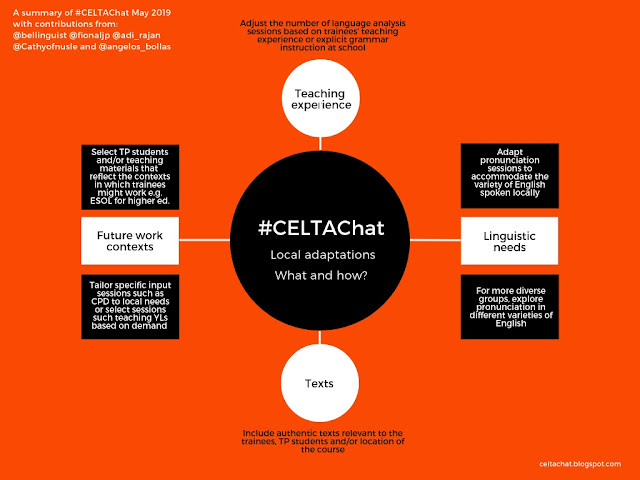We had 15 responses to our #CELTAchat survey: What's going on? Many thanks for your time and answers as your replies help us to understand a lot more about our followers, which was our purpose.
Summary of results
Question 1
2 out of 15 respondents identified themselves as not being teacher trainers but senior teachers looking after new teachers and / or needing to be aware of initial teacher trainer practice. This is great to know as collaboration with teachers who provide ongoing support for newly qualified teachers is very much welcomed.
Question 2
This 63.3% who have never participated are our target audience for this survey. We really wanted to attract the attention of followers who are not participating to find out why. The following question gave us some insight into this.
Question 3
We are extremely happy to see a 93% readership for summaries or transcripts 😀.
Question 4
If you have answered 'no' to any/all of the
above questions, please let us know why
you are following us.
Reasons given were:
A feeling of exclusion
😕 Oh dear! We decided on the original name as we were
three CELTA trainers but pretty soon we realised that
wanted to be inclusive and encouraged Trinity CertTESOL trainers too. If you are a trainer or a mentor of newly qualified teachers, you are a very welcome follower as either an active participant or a reader, as of course is anyone who is interested in reading our blog.
Time constraints
This was a problem in terms of geographical time zones and/
or teaching schedules and/or personal workload/life balance.
Having a one-hour live chat followed by a 24-hour
asynchronous chat was designed with some of these issues in mind. If anyone has any ideas on how to address this, please let us know in the comments below. Maybe we could have a volunteer moderator in another time zone so we could have two live chats within the 24-hour time scale? 💭
We also had some positive feedback here and some thanks. 😎🙏
Question 5
Please let us know how we can persuade
you, or make it easier for you, to join us in
suggesting topics and to participate in our
monthly chats. Any other feedback is very
welcome.
Some responses here followed a similar theme in terms of time constraints. There was a suggestion for the time to be rotated month to month. Again, ideas welcome - do we have a volunteer daytime moderator to have possibly three live sessions on the same day? Let us know in the comments below!
Another issue mentioned was #hashtag conversation confidence. In my experience, the best or only way to gain confidence is by having a go. It's certainly how I'm learning. Theory is useful but limited as active participation is practical.
However, I can offer some tips:
- Use TweetDeck on a PC - this tool makes it much easier to follow a hashtag chat - in fact, I wouldn't recommend trying to follow a chat without it
- Prepare some ideas before the chat starts - you could even write down some ideas if you know what you want to contribute or ask and then copy and paste into the chat
- Don't forget the hashtag # so participants in the chat can see your tweets
- If you want to participate and it's your first time, just have a go!
One respondent mentioned a difficulty in locating older transcripts. Thank you 🙏 for drawing this to our attention. If you go to our CELTAchat blog and look on the right-hand side, you'll see first of all a Twitter Feed and below that you'll see Pages - this is a list of all our transcripts which you can just click on to access any transcript. However, I originally used Storify to create transcripts but this social media service shut down. Before they went out of business, I understood that downloaded transcripts would be safe. However, sadly, it seems that these transcripts have been lost.
Below Pages, you'll see Blog Archive where you can find summaries and this experience of losing transcripts highlights the importance of summary writing, which was another factor mentioned as a reason for not participating in suggesting topics - 😱 fear of being asked to write a summary. Please don't let this stop you. We don't and can't force anyone to do anything, although yes, we might ask. We are extremely grateful to those that do but completely understand if you can't or don't want to.
Thank you for participating in our survey - very much appreciated! Any more feedback also very welcome in the comments below.
By Fiona @fionaljp












